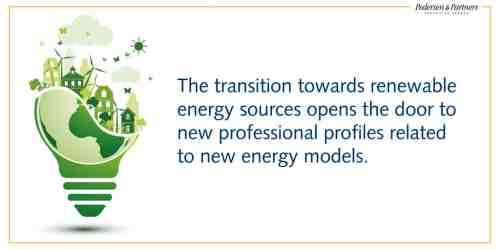Sustainability Trends in Energy
It was noticeable that after becoming President of the United States earlier this year, one of Joe Biden’s very first acts in office was to rejoin the Paris Agreement on Climate Change on behalf of the US, and this move may signal a general realignment in terms of sustainability and climate. A recent UN Development Programme survey of over 1.2 million people in 50 countries found that almost two-thirds of people say that climate change is a global emergency. For instance, in eight of the ten surveyed countries with the highest power-sector emissions, a majority of people supported more use of renewable energy. As a developed and urbanised region, the European Union clearly plays a key role here.
- The EU has established ecological transition as one of the three main points of the European Recovery Plan, along with digitalisation and reindustrialisation. The European Commission has identified three strategic axes for ecological transition: development of renewable energies, energy rehabilitation and efficiency, and sustainable mobility.
- The “race for renewables” forms part of the energy transition project, with the goal of a decarbonised economy. Almost all EU Member States are setting targets in their national energy plans, pushing renewables and clean energies.
- For large companies in the sector, the trend is to increase their investments in renewables such as wind or solar. These major players are currently reviewing their strategies, undergoing deep strategic and cultural change. Energy companies face a new scenario, in which their strategy is determined by technological developments and increasing customer awareness of climate change.
- The energy market is moving towards a low-carbon production model, which must necessarily be accompanied by technological developments that will make renewable energies the most cost-efficient alternative, as well as the cleanest. The digitalisation of the energy market is reducing the operating costs of renewable energies, making them increasingly more competitive with traditional energies.
- “Green Hydrogen” has emerged as a new concept in renewables. Large energy companies have asked the EU to promote the development of renewable hydrogen solutions by supporting technological advances that increase their efficiency and competitiveness. Several large energy players have launched the “Green Hydrogen Catapult” platform to promote the production and use of hydrogen as an energy source. Some sectors think that hydrogen is a viable energy and a zero emissions alternative for the clean transport of goods by land, sea and air, as well as an opportunity for the electric car.
- Many of the corporate operations in the market are now led by large institutional investors or entrepreneurs from large electricity companies. Specialised funds are betting heavily on the energy sector making significant investments in responsible and sustainable companies in the natural gas value chain, as well as in renewable and low-emission energy companies that favour de-carbonisation.
As we can see, a transition is taking place towards a model of sustainable climate development. Most countries have announced ambitious emission reduction commitments, but it remains to be seen whether these commitments will translate into the alignment of the climate policies from the main carbon-emitting countries, thus achieving an effective energy transition.
This transition towards renewable energy sources opens the door to new professional profiles related to new energy models. This new reality means that some of the traditional professions must evolve, as companies look for leaders who can drive this new industrial revolution, mainly based on innovation, digitalisation, ecological transition, and new business models. The three main players that will compete in this market (new companies specialised in renewable energy, large energy companies that are committed to new business units, and capital companies that arrive with strong investments) will face the challenge of selecting professionals with the knowledge, skills, abilities, and competencies to fully address the challenges of this sector.
About the author:
Elisa Martinez de Miguel is a senior consultant at Pedersen & Partners and has been with the firm since 2011. Prior to joining the firm, Ms. Martinez de Miguel worked for over twelve years in the Executive Search industry and has a wealth of knowledge and expertise in leadership consulting, change management, and corporate process redesign, particularly focusing on Recruitment and Evaluation, as well as coaching and management development. In addition, she has strong expertise in the Industrial sector with focus in the energy sub-practice. Before joining the Executive Search industry, Ms. Martinez de Miguel spent six years at an Industrial Group, as a Manager in charge of Corporate Resources.


